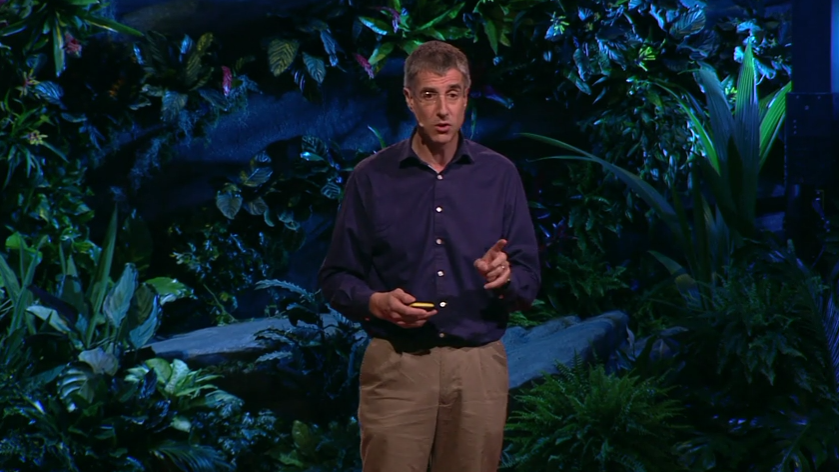I'm a neuroscientist. And in neuroscience, we have to deal with many difficult questions about the brain.
我是個神經生物學家。在神經生物學研究里,我們需要處理很多關于大腦的難題。
But I want to start with the easiest question and the question you really should have all asked yourselves at some point in your life,
不過我今天要從這個最簡單的問題開始,這個問題是大家應該在以前問過自己的,
because it's a fundamental question if we want to understand brain function.
因為如果大家想了解大腦功能的話。
And that is, why do we and other animals have brains?
這個問題是很基本的,那就是,為什么我們和其他動物都有大腦呢?
Not all species on our planet have brains, so if we want to know what the brain is for, let's think about why we evolved one.
地球上不是所有物種都有大腦,所以要搞清大腦有什么用,那我們應該先考慮為什么我們進化出了大腦。
Now you may reason that we have one to perceive the world or to think, and that's completely wrong.
大家也許覺得我們有大腦是為了感知世界或者思考,其實是完全錯誤的。
If you think about this question for any length of time, it's blindingly obvious why we have a brain.
如果再好好思考一段時間的話,其實我們有大腦的原因很明顯。
We have a brain for one reason and one reason only, and that's to produce adaptable and complex movements.
大腦的存在,有且僅有一個原因就是為了生成有適應性的、復雜的動作。
There is no other reason to have a brain.
沒有其他原因了。
Think about it. Movement is the only way you have of affecting the world around you.
想想看。動作是你唯一對世界產生影響的方法。
That's not quite true. There's one other way, and that's through sweating.
當然也不盡然,另一個辦法是通過排汗。
But apart from that, everything else goes through contractions of muscles.
不過除了那個以外,所有事情都是由肌肉的收縮來辦到的。
So think about communication -- speech, gestures, writing, sign language -- they're all mediated through contractions of your muscles.
想想我們的溝通方式--語言、手勢、寫作、手語--都是由肌肉的收縮來完成的。
So it's really important to remember that sensory, memory and cognitive processes are all important,
所以重要的一點就是感知、記憶,認知過程也很關鍵,
but they're only important to either drive or suppress future movements.
但是它們的重要性都只是在于它們能夠促使或者抑制動作的發生。
There can be no evolutionary advantage to laying down memories of childhood or perceiving the color of a rose if it doesn't affect the way you're going to move later in life.
如果不是能夠影響到大家未來生活中的動作的話,能夠記住小時候的回憶或者感知到玫瑰花的顏色,在進化這一點上沒有任何特別的優勢。

Now for those who don't believe this argument, we have trees and grass on our planet without the brain,
如果有誰不相信這個說法,我可以舉例說不會運動的樹和草都沒有大腦,
but the clinching evidence is this animal here -- the humble sea squirt.
不過有一種動物提供了確鑿的證據--不起眼的海鞘。
Rudimentary animal, has a nervous system, swims around in the ocean in its juvenile life.
海鞘是一種初等生物,有神經系統,生命初期在海中游動。
And at some point of its life, it implants on a rock.
然后在某一時刻海鞘會把自己移植到巖石上再也不移動。
And the first thing it does in implanting on that rock, which it never leaves, is to digest its own brain and nervous system for food.
海鞘在巖石上固定后的第一件事就是把自己的大腦和神經系統作為食物消化掉。
So once you don't need to move, you don't need the luxury of that brain.
也就是說,一旦不用再移動也就不需要大腦這樣的奢侈品了。
And this animal is often taken as an analogy to what happens at universities when professors get tenure, but that's a different subject.
并且,這種動物常常被類比到大學里面,教授獲得終身職位之后的情況,不過那是另一個話題了。



